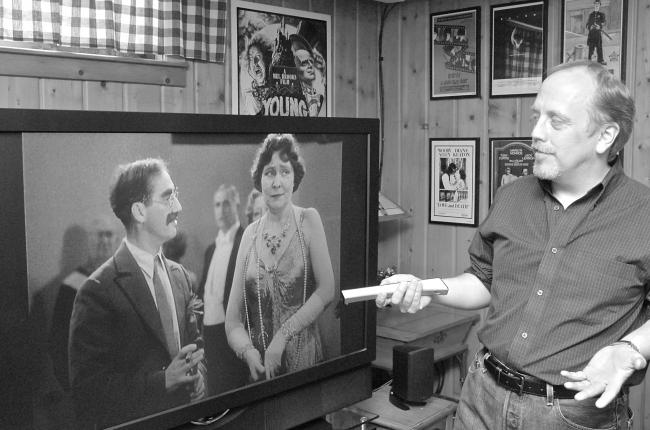From studying Groucho Marx to Captain James Lovell, local writer has authored eclectic life
Professional film and science writer Mark Bourne of West Seattle seems to be getting scrutinized by a couple of his onscreen heroes, Groucho Marx and Margaret Dumont. Bourne believes old-time comedy films might be just the ticket to take the edge off of the recession blues.
Thu, 04/30/2009
Like the Starship Enterprise itself, the life of West Seattle writer Mark Bourne achieved lift-off by a variety of coalescing components. And like the fabled spaceship, movies have played a major role in Bourne’s identity.
A professional science writer, and reviewer for the hugely popular website film.com, and former reviewer of the now-archived DVD Journal.com, he is a member of the Seattle Astronomical Society. Bourne was steeped in Star Trek when he was hired in 1992 to produce a show that originated at the Oregon Museum of Science and Industry’s Kendall Planetarium. The production, green-lighted by Paramount, was based on “The Next Generation.”
Bourne did the research, then scripted the show's story and dialogue.
“The audience members were called ‘cadets,’ and sat beneath the 60-foot dome as (helmsman) Geordi La Forge narrated, jumping them through wormholes in space to rendezvous with the Starship Enterprise,” said the 47 year-old long-time Trekkie. Captain (Jean-Luc) Picard greeted the cadets when they arrived.
“I loved hearing Patrick Stewart speaking my words,” he said like a thrilled teen. “That was awesome. He made them sound so great.”
“That’s where I met my wife. Elizabeth was the show’s computer graphics artist and we worked side by side," he added.
Also an author, Elizabeth Bourne is an executive at Tsongas Trial Litigation Consulting downtown.
In addition to Hollywood astronauts, Bourne also worked with the real thing.
“I wrote an audio tour through the Adler Planetarium in Chicago where I interviewed Captain James Lovell,” said Bourne. "We had an Apollo 13 mockup. He guided me through specific information and artifacts from the spacecraft. He was very generous with his time, recalling his personal experiences during the flight's crisis."
“He loved talking about his mission and said he wants to be remembered for that, especially since Tom Hanks portrayed him in the movie,” he said.
For his master's thesis at the University of Nebraska where he studied theater,
Bourne produced two live, multimedia theater productions based on Ray Bradbury stories in the campus planetarium.
His work caught the attention of the Rochester (New York) Museum and Science Center and he became their astronomer intern, producing and
writing public multimedia astronomy shows.
“It was a great opportunity to meld my love of theater with astronomy,” Bourne said. “Compared to the small planetarium in Nebraska, this one was on a whole new scale, and considered one of the grande dames of planetariums.
“The purpose of the planetarium show is to engage audiences, to enlighten and wow them to learn astronomy on their own," he said. "I beat out candidates with more mathematical expertise but I could put on a better show.”
Working on projects for Discovery Communications, Bourne wrote the audio tours for the Seattle Art Museum’s “Roman Art From the Louvre” and “Inspiring Impressionism” shows last year, where he had intimate access to the artwork he researched prior to public viewing.
Problem is, museums, like many institutions depending on philanthropy, are budget cutting, and such art shows will be less frequent in the near future said Bourne, who is now working on a Shakespeare-as-secret-agent movie script and novel.
Downstairs in Bourne’s den is the movie room he sometimes calls “The Temple of Dude” decorated with large movie posters of “Raiders of Lost Ark,” “Young Frankenstein,” “The Day the Earth Stood Still,” “The Third Man,” and other classics. On the coffee table facing his large-screen TV sit four channel changers in a row that seem to have more buttons collectively than the deck of the Starship Enterprise.
He popped in a DVD of the Marx Brothers classic “Duck Soup” and managed the remotes with ease. If not a remedy, Bourne thinks laughter through old-time comedy films might be the best medicine for peoples’ financial blues, and admires the elixir of Charlie Chaplin, Harold Llyod, and Buster Keaton, in general.
Bourne pointed out that “Duck Soup” was released in 1933, one year before the “Hays Code” became strictly enforced. The code set censorship guidelines for the movie industry.
“In this film we see the tail end of a generation of films getting away with sexual innuendo and sly humor,” said Bourne. “If ‘Duck Soup’ were made a year later it would have been a very different film.
“Just like during the Depression, it’s really easy to get behind somebody letting the air out of stuffed shirts, tweaking his nose at authority figures, people who seem to be getting along in life a little too easily,” Bourne said of Groucho Marx’s portrayal of Rufus T. Firefly.
“He did things we’d like to be able to do, like giving bullies the ‘what for,’” said Bourne. “If the Marx Brothers were around today, Groucho would portray the CEO of AIG, instead of the leader of Freedonia.”


